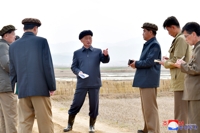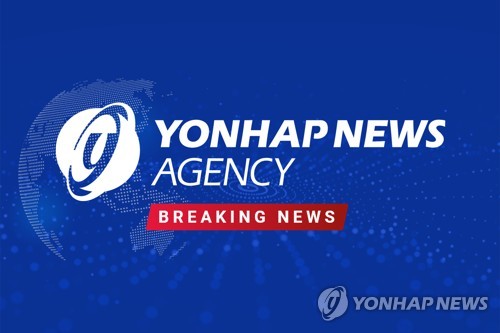Expert calls for PR strategies for Korea-US nuclear energy deal
By Chang Jae-soon
WASHINGTON, Nov. 27 (Yonhap) -- South Korea and the United States should come up with good PR strategies for an envisioned nuclear energy cooperation deal to pre-empt any misunderstanding of an issue that is seen as carrying highly symbolic meaning for their alliance, a U.S. expert said.
After more than four years of negotiations, Seoul and Washington are now close to agreement on how to revise their 1974 nuclear energy cooperation pact, known as the "123 agreement." It centered on banning the South from enriching uranium or reprocessing spent fuel in exchange for U.S. technological assistance.
The main sticking point in the negotiations has been Seoul's demand that it be allowed to undertake enrichment and reprocessing activities, just as Japan is allowed to do so under a U.S.-Japan nuclear cooperation agreement. But Washington has been reluctant about Seoul's demand due to proliferation concerns.
It is unclear how those differences were resolved, but the two sides said in a joint statement, issued after last month's "two plus two" alliance talks involving their foreign and defense ministers, that they made "significant progress" in the sensitive negotiations.
Whatever the outcome, the two sides should now focus on devising strategies to better sell the deal to the public, Kim Du-yeon, a nuclear policy program researcher at the Carnegie Endowment for International Peace, said in a recent paper.
"The final, and perhaps equally important, piece of this puzzle is devising the right communications strategy in both capitals about the new 123," Kim said, adding that the deal should be differentiated from other agreements to show how it is more advanced, unprecedented and modern.
"This would be especially important if the rollout of the new agreement gets tangled up in other hot political issues, such as South Korea-Japan relations or sticky alliance matters, in which the 123 could become held hostage, its merits unnoticed or, worse, misrepresented," she said.
Media speculation has been ripe about how the final agreement turned out to be.
Various possibilities have been raised, including one that says the U.S. could allow the South to conduct reprocessing for research purposes while leaving other reprocessing and enrichment activities subject to advance consent from the U.S.
"South Korean victories in the new 123 will be noticeable to an expert eye, but for public relations, the key is translating technical jargon into easily understood language so that technical compromises can also be heralded as political victories," Kim said. "If an agreement is in sight, it may be high time to devise an effective communications strategy in both capitals."
The 1974 pact had been scheduled to expire in March, and Seoul and Washington launched negotiations in 2010 to revise it. But after failing to find a compromise, they extended the existing pact to March 2016 to buy more time for negotiations.
In a broad sense, Kim said that the overarching challenge in the negotiations has been to reconcile U.S. President Barack Obama's goal of global nuclear nonproliferation and South Korea's desire for enhancing energy security through enrichment and reprocessing.
The issue has taken on greater political meaning as Seoul took it as a test of the alliance's strength, Kim said.
"South Korean leaders feel that their country's strategic and economic importance and outstanding record as an ally should make the United States willing to grant permission for ENR (enrichment and reprocessing), given the importance of this issue to South Korea," Kim said.
"The U.S. policy focus in general is on the threat of reprocessing and enrichment, as well as the precedent it would set for U.S. global nonproliferation policy when negotiating 123 agreements with other countries if Washington granted ENR consent to South Korea," she said.
If Seoul did not receive U.S. permission to obtain the right to enrichment and reprocessing, "a face-saving measure" would be needed given public expectations derived from the politicization of the negotiations in South Korea, the expert said.
jschang@yna.co.kr
(END)
-
 Defense chief says N. Korea's hypersonic missile 'unsuccessful' in last-stage glide flight
Defense chief says N. Korea's hypersonic missile 'unsuccessful' in last-stage glide flight -
 Overdue debut of Korean abstract art pioneer Yoo Young-kuk at Venice Biennale
Overdue debut of Korean abstract art pioneer Yoo Young-kuk at Venice Biennale -
 Relax, immerse yourself in scents at Venice Biennale's Korean Pavilion
Relax, immerse yourself in scents at Venice Biennale's Korean Pavilion -
 N. Korea has capability to genetically engineer biological military products: U.S. report
N. Korea has capability to genetically engineer biological military products: U.S. report -
 S. Korea marks 30th anniv. of Korean Pavilion at Venice Biennale with contemporary art
S. Korea marks 30th anniv. of Korean Pavilion at Venice Biennale with contemporary art
-
 Overdue debut of Korean abstract art pioneer Yoo Young-kuk at Venice Biennale
Overdue debut of Korean abstract art pioneer Yoo Young-kuk at Venice Biennale -
 Relax, immerse yourself in scents at Venice Biennale's Korean Pavilion
Relax, immerse yourself in scents at Venice Biennale's Korean Pavilion -
 Defense chief says N. Korea's hypersonic missile 'unsuccessful' in last-stage glide flight
Defense chief says N. Korea's hypersonic missile 'unsuccessful' in last-stage glide flight -
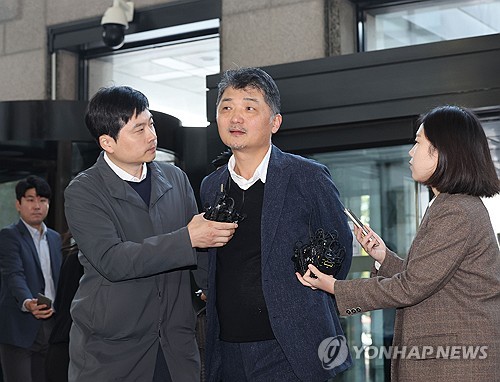 Questioning necessary for Kakao founder for suspected stock rigging: prosecution
Questioning necessary for Kakao founder for suspected stock rigging: prosecution -
 S. Korea marks 30th anniv. of Korean Pavilion at Venice Biennale with contemporary art
S. Korea marks 30th anniv. of Korean Pavilion at Venice Biennale with contemporary art
-
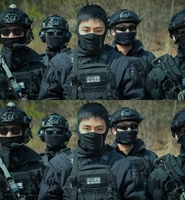 Facebook page unveils photos of BTS member V in counter-terrorism unit gear
Facebook page unveils photos of BTS member V in counter-terrorism unit gear -
 Gov't likely to accept university chiefs' request to lower med school enrollment quota
Gov't likely to accept university chiefs' request to lower med school enrollment quota -
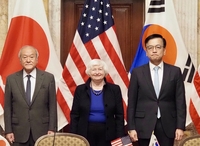 (4th LD) Finance chiefs of S. Korea, U.S., Japan recognize 'serious' concerns over 'sharp' won, yen depreciation
(4th LD) Finance chiefs of S. Korea, U.S., Japan recognize 'serious' concerns over 'sharp' won, yen depreciation -
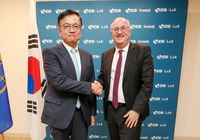 S. Korea to provide US$200 million in humanitarian aid to Ukraine this year
S. Korea to provide US$200 million in humanitarian aid to Ukraine this year -
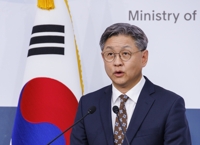 Russia's denial of entry of S. Korean national unrelated to bilateral ties: Seoul official
Russia's denial of entry of S. Korean national unrelated to bilateral ties: Seoul official















